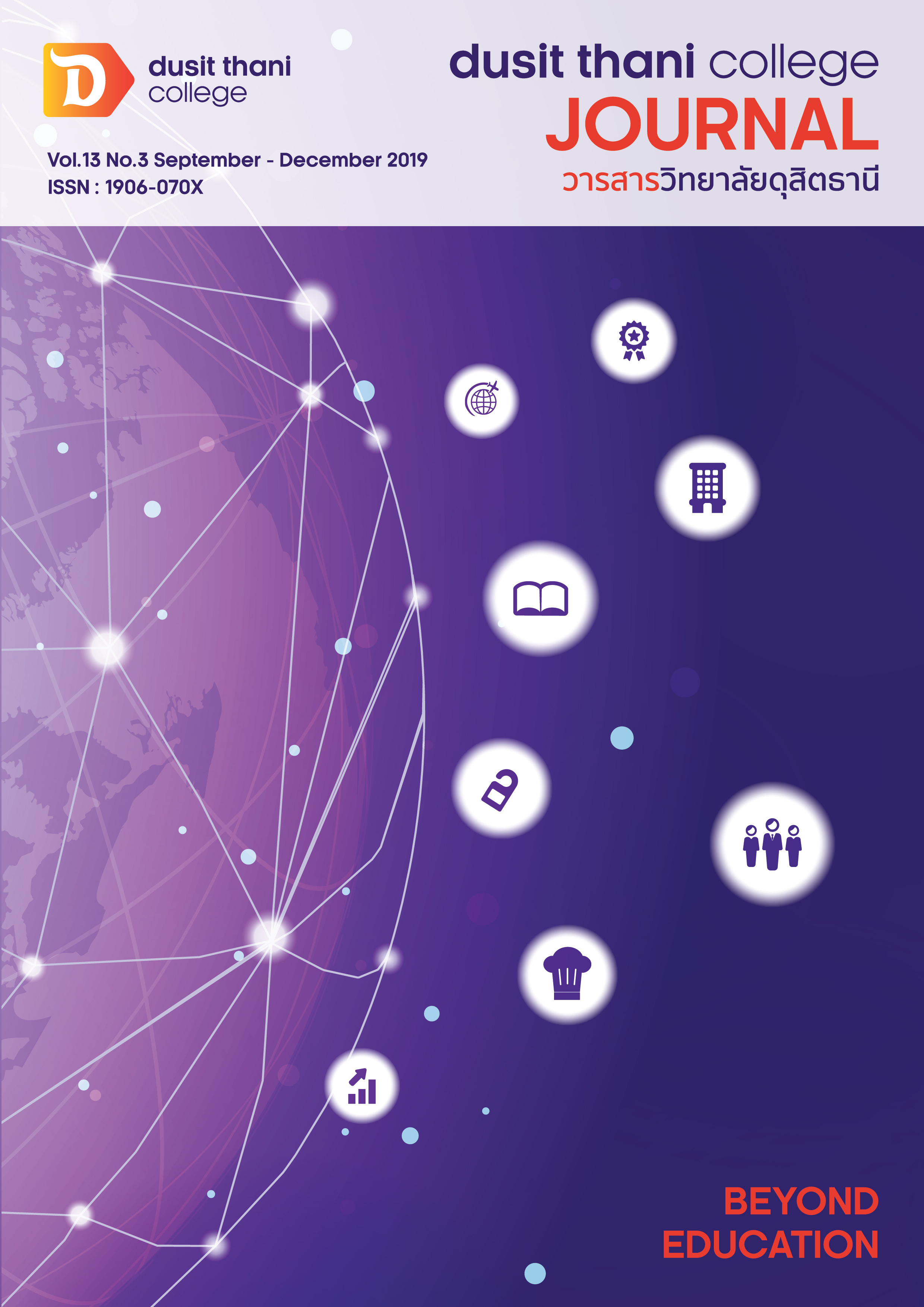Collegiality: An Effective Environment for Professional Development
Main Article Content
Abstract
Collegiality is an ideal academic environment and relationship for professional development both in most of business settings and academic institutional settings. The purposes of this research were to study 1) the phenomena concerning what, how, lessons learned, from the managed collegiality and attitudes of participants toward this collegiality 2) possibility of the managed collegiality and recommendations. This research employed phenomenological qualitative research methodology. Participants were five human development officers, voluntarily purposive selected according to specified criteria. Instruments used for collecting data were 1) electronic camera 2) journal 3) questionnaire 4) blank paper for opinion writing.
The findings were 1) all participants were male 42-48 years of age, master degree, and had 21.6 average year of experiences 2) collegiality phenomena : a) presentations of selected subject matter-collegiality, self-directed learning, transformative learning, and narrative learning. b) opened-discussions c) writing journals 3) learned lessons : a) good health b) happy family c) desire behaviors in life and general topics 5) perceived attitudes were mutual trust, mutual respect, positive body language, non judging tendency 6) managed collegiality was possible 7) recommendations : must have assigned in-charge person but should take turn by all participants, subject matter selection and presentation should also take turn, and in business setting collegiality could be an excellent inspiration for both knowledge management and professional development moving towards life-long learning organization.
Article Details
Article Screening Policy
- All research and academic articles to be published must be considered and screened by three peer reviews in the relevant field / article.
- All articles, texts, illustrations and tables published in the journal are the personal opinions of the authors. Editors don't always have to agree. And no responsibility whatsoever is the sole responsibility of the author.
- The articles to be published must never be published. Where did you first publish? And not in the consideration of other journals If the audit found that there has been a duplicate publication It is the sole responsibility of the author.
- Any article that the reader sees as being plagiarized or impersonated without reference. Or mislead the work of the author Please let the journal editor know it will be your greatest blessing.
References
2. Cavanagh, J. B. (2010). Managing collegiality: The discourse of collegiality in Scottish school leadership. Doctor of Education, University of Glasgow.
3. Graham, A. (2015). Hollywood activism, daytime verité, and the March on Washington. German Historical Institute.
4. Jarvis, P., Holford, J., & Griffin, C. (2003). The Theory and Practice of Learning. London:
Routledge Falmer.
5. Knuth, D. E. 2005. 40th Anniversary Symposium Department of Computer Science (Online). https://www.cs.cornell.edu/events/40years, October 1, 2016.
6. Inwang, Kanyamon. (2018). Human Resources and Organizational Development. Retrieved July, 18, 2018, from: http://www.thaihealth.or.th/blog/myblog/topic/144.
7. Nagavajara Chetana (2013). From Selfless Giving to Commodification : The Dilemma of Higher Education.Bangkok: Knowledge Network Institute of Thailand.
8. Office of the National Economics and Social Development Board. 2012. The Eleventh National Economic and Social Development Plan (2012-2016). Retrieved December, 20, 2015, from http://www.nesdb.go.th/Portals/0/news/plan/p11/plan11.pdf.
9. Pipatphokakul, Pisit. (2018). Business Service and Asean Economics Community. Retrieved July, 18, 2018, from: http://www.impressionconsult.com/web/index.php/articles/334article186072012.html.
10. Prikaset, Udom. (2014). IT-effected Training. Retrieved March, 5, 2015, from:
https://positioningmag.com/6799.
11. Lazega, E. (2001). The Collegial Phenomenon The Social Mechanisms of Cooperation among Peers in a Corporate Law Partnership. Oxford University Press Inc.
12. Loe, D. R. (2010). Teacher Transformation and Critical Collegiality in Online Learning
Environments. Doctor of Philosophy Thesis in Health, and Human Services ,
Kent State University.
13. Mcguire, T. (2005). How a workplace can become collegial. Retrieved July, 13, 2005, from:http://www.spokesman.com/stories/2005/jul/13/how-a-workplace-can-become-collegial.
14. Nolan, C. (2002). "Human resource development in the Irish hotel industry: the case of the small firm", Journal of European Industrial Training, 4 (26): 88-99.
15. Nolan, J., & Hoover, L. A. (2005). Teacher supervision and evaluation:
Theory into practice. Hoboken, NJ: John Wiley & Sons, Inc.
16. Moustakas, C. (1994). Phenomenological Research Methods. Thousand Oaks, CA: Sage.
17. Thanawut Withan (2008). Why You Need to Slow Down. Cheewajit Magazine. (1 June 2008): 19.
18. Shosha, G. A. (2012). “Employment of Colaizzi's strategy in descriptive phenomenology: A reflection of a researcher.” European Scientific Journal 8 (27): 31-43.
19. Yuksel, P. & Yildirim, S. (2015). Theoretical Frameworks, Methods, and Procedures for
Conducting Phenomenological Studies in Educational Settings. Turkish Online Journal
of Qualitative Inquiry.


